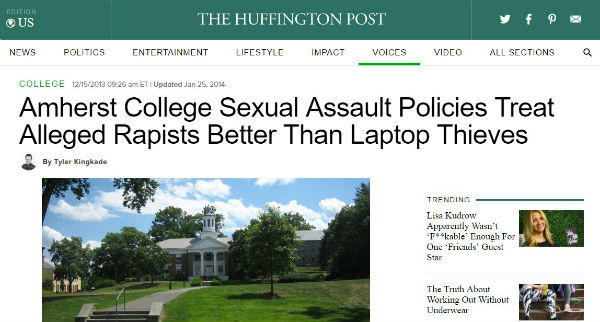
Pro tip for accusers: Don’t give interviews while an appeal is pending
This might be the first time a Huffington Post article saved a student from being branded a rapist for his entire life.
In likely the biggest due-process case The College Fix has ever covered, a federal judge has ruled an expelled student’s multi-pronged lawsuit against Amherst College can continue on most prongs.
A judge who, revealingly, failed to cite the past year’s two biggest due-process wins for accused students in his judicial backyard, against Brandeis and Columbia, while still finding a way to rule in the accused student’s favor.
This is the “blacked out” rape case filed in spring 2015, in which the accuser’s unearthed text messages seemingly confirmed that she had violated an incapacitated male before accusing him of rape.
MORE: She initiated sex when I couldn’t consent, expelled student claims
“John Doe” appeared to be down in the count as recently as November, when a different federal judge (the immigration-order guy!) ruled that he couldn’t depose “Sandra Jones” in his Amherst suit because it would inflict “trauma” on an accuser of dubious credibility.
But lo and behold, his accuser’s eagerness to publicly threaten Amherst with a deluge of negative press if it didn’t expel Doe has brought him back off the mat.
Judge questions ‘credibility’ of accuser’s version
As exhaustively analyzed by Brooklyn College Prof. KC Johnson, co-author of the new book The Campus Rape Frenzy, Judge Mark Mastroianni’s Tuesday order has some surprises.
He upheld Doe’s breach-of-contract claim against Amherst’s refusal to follow its own rules, and his Title IX claim that Amherst showed “deliberate indifference” by refusing to investigate Jones’ alleged violation of Doe.
MORE: Amherst plays down damning text messages by rape accuser
Mastroianni said Jones’ texts reveal she “proposed lying” about what she had done; that Amherst misled Doe into thinking he couldn’t do his own investigation; and that the school never bothered to obtain Jones’ damning text messages, in spite of the fact they were mentioned “twice during the hearing”:
These texts can be read in a way that raises additional questions about the credibility of the version of events Jones gave during the disciplinary proceeding against Doe.
Her political agenda might doom her accusations
What came out of left field, according to Prof. Johnson, is the weight Mastroianni put on Doe’s internal appeal of the ruling against him – a document that received “virtually no attention in the May oral argument.”
Two days after Amherst found Doe “responsible” and expelled him, The Huffington Post published an article about Amherst that quoted a student anti-rape activist. Here’s what she said:
The typical laptop thief is suspended for five semesters. Rapists are not suspended for that long, if at all. No rapist convicted by a hearing board has been expelled from Amherst in 20 years. That’s unacceptable and something Amherst has to change immediately.
The content of her quote and its source is blacked out in Doe’s appeal letter, which is part of the court record.
But the rest of the letter says enough to confirm Doe is citing the HuffPo article, which he said showed Jones’ “apparent crusade to see a student expelled for rape” – and which, Johnson notes, does not identify her “as an accuser in a pending sexual assault appeal.”
MORE: Amherst showed ‘startling indifference’ to the truth
Doe was the first person “expelled for sexual misconduct in 20 years,” he wrote, “fulfilling the desire [Jones] expressed in the article.” He showed the article to two of his witnesses, and they agreed they would “change their testimony” that Jones had no “ulterior motivation” to accuse him.
Amherst waved off this appeal, but Mastroianni has put Jones’ “contemporaneous accusers’ rights activism front and center” by referencing it four times, Johnson says.
Spotlight back on different judge with ‘circuitous reasoning’
Mastroianni noted that when Jones accused Doe:
[S]he was involved in a student-led movement to compel the College to change the way it handled sexual assault allegations, including by expelling a male student accused of sexual misconduct. [Doe] further asserts the College was actively trying to appease the student-led movement and was aware both Jones and LR [a witness against Doe and member of a sexual-misconduct committee] were involved with the student-led movement.
According to Johnson, this is bad news for Judge James Robart, who shielded Jones from deposition and turning over relevant communications to Doe.
MORE: Judge rejects subpoena on accuser who violated blacked-out student
The judge used the “extremely dubious rationale” that deposition would traumatize her (a person who might have sexually violated Doe) and that Amherst had the relevant documents already (nope):
Robart’s claim that [Jones] would possess no relevant information is unsustainable. The circuitous reasoning of his initial decision to quash the subpoena makes it entirely possible Robart will refuse to back down. But given that Mastroainni’s opinion suggests that it’s plausible, based on the facts before the court, to deem [Jones] a possible perpetrator of sexual assault, perhaps it’s time for Robart to drop the trauma claim.
Reason‘s Robby Soave points out another telling part of this case that could lead Robart to give Jones and her “political agenda” a second look.
MORE: Lawsuit claims college employee made false accusation to not get fired
Jones’ collaborator apparently convinced a memory-free Doe that he was the aggressor:
Months later, Jones wrote an essay about the encounter for a student publication. “It began consensually, but evolved into something that was decidedly not,” she wrote.
Doe read the essay and felt sorry about what had happened—though he still had no memory of it, and maintained that he had not engaged in non-consensual sex. He approached a student identified as “LR” in the lawsuit. … According to the lawsuit, Doe “explained that while he still had no memory of his interaction with Jones, he hoped to get some guidance on what he could do to make amends to Jones.”
LR told him to seek counselling and continuing avoiding Jones. LR also treated this encounter as a sort of admission of wrongdoing on Doe’s part. LR reported Doe to Amherst’s Title IX team, and informed Jones that she would testify on Jones’ behalf if any complaint was made.
This was in April of 2013, more than a year after the initial encounter. Jones did not file her own complaint until October 28, 2013.
MORE: Appeals court reinstates reverse discrimination case against Columbia
This turn of events is pretty incredible, and it came from a judge (Mastroianni) who seemed dead-set on not giving an inch to wrongfully accused students, Johnson writes:
In a case at UMass, he sided with the university, despite ample grounds for doubting UMass’ fairness. In this case, he waited nine months (and a day) after the hearing in the case to render his decision, which cited every recent 1st District campus sexual assault decision but one—the Brandeis opinion written by Judge Saylor. [Two years ago, Mastroianni also presided over a settlement between Amherst and a wrongfully accused student.] …
In allowing the Title IX portions of the lawsuit to proceed, Mastroianni avoided any mention of the important 2nd Circuit Columbia case. That decision suggested that a frenzied campus atmosphere … could in and of itself provide the necessary baseline to allow a Title IX complaint to survive a motion to dismiss. As with the omission of the Brandeis decision, Mastroianni appears to have chosen to ignore the most favorable decisions for accused students.
It should be clear to Amherst by now that their investigation was so disastrous that even a judge favorably inclined toward kangaroo-court investigations, an appointee of Barack Obama, could not endorse it.
The administration might want to pursue another settlement, and quickly.
MORE: Due process on campus ‘will get worse before it gets better‘
MORE: Amherst stops trying to punish student exonerated of rape charges
Like The College Fix on Facebook / Follow us on Twitter
IMAGE: Shutterstock







Please join the conversation about our stories on Facebook, Twitter, Instagram, Reddit, MeWe, Rumble, Gab, Minds and Gettr.